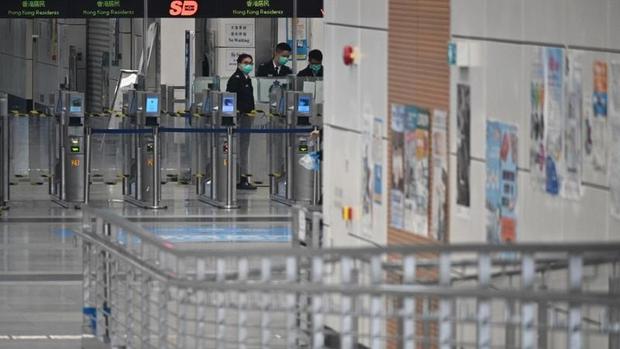 Employees of cross-border bus companies wearing face masks as a preventative measure against the novel coronavirus are seen at the bus stop of Shenzhen Bay Port Hong Kong Port Area on Feb 8, 2020. (PHILIP FONG / AFP)
Employees of cross-border bus companies wearing face masks as a preventative measure against the novel coronavirus are seen at the bus stop of Shenzhen Bay Port Hong Kong Port Area on Feb 8, 2020. (PHILIP FONG / AFP)
HONG KONG – A Hong Kong government official has stressed bringing the COVID-19 pandemic under control before resuming cross-boundary travel.
Meeting the media after a radio program on Saturday morning, Secretary for the Civil Service Patrick Nip Tak-kuen said more discussions between the Hong Kong Special Administrative Region and the mainland are needed on the resumption of travel between the two places.
READ MORE: Medical experts: Sinovac vaccine suitable for people aged over 60
"It is important to have an exchange of views and suggestions between the two sides because both of us are very concerned about our respective epidemic situations," Nip said, adding that "the number one priority is to get our epidemic under control" and have no further outbreak.
More than 1,000 private doctors will participate in the program to provide vaccinations before mid-March, involving up to 1,500 private clinics
Nip said the government would continue engaging with the mainland authorities in a bid to resume cross-boundary travel as early as possible.
Regarding the vaccination program, Nip said the majority of the Sinovac vaccine administration will be arranged through private doctors and clinics.
More than 1,000 private doctors will participate in the program to provide vaccinations before mid-March, involving up to 1,500 private clinics.
People may contact their doctors and get vaccinated at the clinics. No central booking is required, Nip said.
ALSO READ: HK govt refutes false claims about COVID-19 tracing app
They can also receive the jabs at the five community vaccination centers from next Friday and online booking will start on Tuesday.
Nip said the vaccination program will be launched in phases to allow health workers and the public to get used to the procedures.
"We will do it as quickly as possible but at the same time in an orderly and safe manner, and will encourage more people to get vaccinated."


